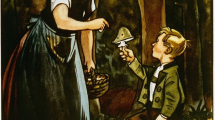Abstract
This essay provides much-needed critical attention and historical context to the long-neglected 1924 edition of Gertrude Chandler Warner’s The Box-Car Children. Commonly overshadowed by its more recent and more popular 1942 version—known as The Boxcar Children—this earlier edition calls attention to the original cultural context of Warner’s classic text. Initially written in and for a different era, The Box-Car Children invites a reconsideration of the book’s aim, intent, and original audience. While the narrative is now routinely viewed through the lens of the Great Depression, it was actually a product of the Jazz Age. This alternative historical backdrop alters the socio-political issues that were bearing upon The Box-Car Children while it was being written and, as a consequence, with which it was originally engaging. An awareness of the role that these topics play in the conception and construction of Warner’s classic American story changes the way we view, discuss, and teach the text.
Similar content being viewed by others
Notes
For a more detailed discussion of the modifications made to the 1942 edition of The Boxcar Children from its 1924 original version, along with the literary, cultural, and pedagogical significance of these changes, please see my chapter “The Boxcar Children and The Box-Car Children: The Rewriting of Gertrude Chandler Warner’s Classic and the Origins of the Early Reader” in The Early Reader in Children’s Literature and Culture, edited by Jennifer Miskec and Annette Wannamaker (London: Routledge, 2016).
While the narrative remains out of print, the full-text of the book became available online from Project Gutenberg in May 2013.
They are: the University of Virginia, the University of Florida, the University of Chicago, the New York Public Library and the Hennepin County Library in Minnetonka, MN.
See, for example, Matthew Huntington’s website “Boxcar Children Education Activities,” available here: http://www.ehow.com/info_7979219_boxcar-children-educational-activities.html. His site also contains links to a number of other online resources that similarly offer information about the Great Depression as necessary background context for the book.
References
Allen, Frederick Lewis. (1931). Only Yesterday: An Informal History of the 1920’s New York:Harper & Row.
Anduri, Lauren. (2009, September) “The Boxcar Children [review]”. School Library Journal, 55(9), 187.
Antiquities of the Shires of Aberdeen and Banff. (1857). Vol 3: Illustrations of the Topography and Antiquities of the Shires of Aberdeen and Banff Aberdeen:William Bennett/Spalding Club. Google Books.
Douglas, Ann. (1995). Terrible Honesty: Mongrel Manhattan in the 1920s New York:Farrar, Straus and Giroux.
Editorial Reviews—From Barnes and Noble. (2013, November 1). Listing for The Boxcar Children. Barnes and Noble. Retrieved from http://www.barnesandnoble.com/w/boxcar-children-gertrude-chandler-warner/1100384065?ean=9780807508527.
Filip, Iulia. (2009, July 3). “Rise of Consumerism and Mass Culture in the 1920s.” Retrieved from https://suite.io/iulia-filip/1z622kc. 26 February 2016.
Fleishhacker, Joy. (2012, September 2). “Fresh Approaches—Noteworthy New Editions and Reissues: Celebrating 70 Years with ‘The Boxcar Children.’” School Library Journal.
Jameson, Fredric. (1981). The Political Unconscious: Narrative as a Socially Symbolic Act Ithaca, NY:Cornell University Press.
Lowe, David. (1967). Ku Klux Klan: The Invisible Empire New York:W. W. Norton.
Luntz, Benjamin F. (2006). Forgotten Turmoil: The Southeastern Kentucky Ku Klux Klan. Xlibris.
Michaels, Walter Benn. (1995). Our American: Nativism, Modernism, and Pluralism Durham, NC:Duke UP.
Plays for Young Audiences. The Boxcar Children. (1999). Story by Gertrude Chandler Warner. Adaptation by Barbara Field. Seattle Children’s Theatre, 1999–2000 Season. Full text of original script available here: http://playsforyoungaudiences.org/wp-content/files_mf/boxcar_excerpt.pdf.
Prohibition. (2011, October 2). Dir. Ken Burns and Lynn Novick. “Episode 1: A Nation of Drunkards.” PBS. Netflix.
Shields, David. (1997). “The Demonization of the Tavern.” The Serpent in the Cup: Temperance in American Literature. Ed. David S. Reynolds and Debra J. Rosenthal. Amherst, MA: University of Massachusetts Press, pp. 10–21.
Sklar, Richard. (1970). The Plastic Age, 1917–1930 NY:George Braziller.
St. Germain, Amos. (1990). “The Flowering of Mass Society: A Historical Overview of the 1920s.” Dancing Fools and Weary Blues: The Great Escape of the Twenties. Eds. Lawrence R. Broer and John D. Walther. Bowling Green, OH: Bowling Green UP, pp. 13–44.
Teachers’ Top 100 Books for Children. (2007). National Education Association. Retrieved from http://www.nea.org/grants/teachers-top-100-books-for-children.html.
Top 100 Chapter Book Poll Results. (2012, July 7). School Library Journal. Retrieved from: http://blogs.slj.com/afuse8production/2012/07/07/top-100-chapter-book-poll-results/.
Warner, Gertrude Chandler. (1924). The Box-Car Children Chicago:Rand McNally.
Warner, Gertrude Chandler. (1942). The Boxcar Children Chicago, IL:Albert Whitman & Company.
Zvirin, Stephanie. (2009, March 1). “The Boxcar Children [review].” Booklist, 61.
Author information
Authors and Affiliations
Corresponding author
Additional information
Michelle Ann Abate is Associate Professor of Literature for Children and Young Adults at The Ohio State University. She is the author of four books of literary criticism: The Big Smallness: Niche Marketing, the American Culture Wars, and the New Children’s Literature (Routledge, 2016), Bloody Murder: The Homicide Tradition in Children’s Literature (Johns Hopkins University Press, 2013), Raising Your Kids Right: Children’s Literature and American Political Conservatism (Rutgers University Press, 2010), and Tomboys: A Literary and Cultural History (Temple University Press, 2008).
Rights and permissions
About this article
Cite this article
Abate, M.A. Not Hoovervilles, But Hooch: Gertrude Chandler Warner’s The Boxcar Children and The Roaring Twenties. Child Lit Educ 47, 257–266 (2016). https://doi.org/10.1007/s10583-016-9275-5
Published:
Issue Date:
DOI: https://doi.org/10.1007/s10583-016-9275-5




